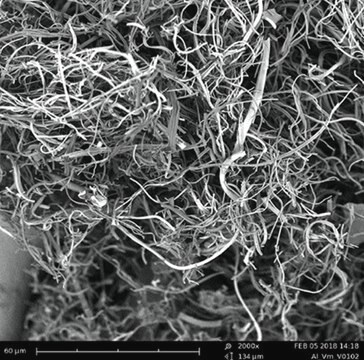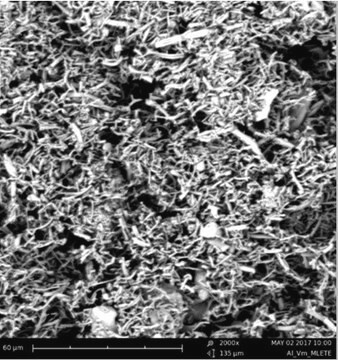551643
Oxyde d′aluminium
nanowires, diam. × L 2-6 nm × 200-400 nm
Synonyme(s) :
Alumina
About This Item
Produits recommandés
Forme
nanowires
Diam. × L
2-6 nm × 200-400 nm
Pf
2040 °C (lit.)
Chaîne SMILES
O=[Al]O[Al]=O
InChI
1S/2Al.3O
Clé InChI
TWNQGVIAIRXVLR-UHFFFAOYSA-N
Vous recherchez des produits similaires ? Visite Guide de comparaison des produits
Description générale
Application
- Self-Assembly of Ionic Superdiscs in Nanopores.: This research explores the self-assembly of ionic superdiscs in nanopores enhanced by aluminum oxide, offering a new avenue for creating highly ordered nanostructures useful in energy storage and conversion technologies (Li et al., 2024).
- Improved Fog Collection on a Hybrid Surface with Acylated Cellulose Coating.: Demonstrates the application of aluminum oxide in developing hybrid surfaces for enhanced fog collection, a technique that could be adapted for moisture management in battery and energy systems to improve operational stability and efficiency (Zhan et al., 2024).
- Alumina - Stabilized SEI and CEI in Potassium Metal Batteries.: Research highlights the role of aluminum oxide in stabilizing solid electrolyte interphase (SEI) and cathode-electrolyte interface (CEI) layers in potassium metal batteries, crucial for enhancing the longevity and performance of next-generation batteries (Liu et al., 2024).
- 3D-Printed Carbon Nanoneedle Electrodes for Dopamine Detection in Drosophila.: Utilizes aluminum oxide in 3D-printed carbon nanoneedle electrodes, offering significant improvements in the sensitivity and specificity of neurochemical detection, applicable in battery technology for biosensors and medical devices (Shao et al., 2024).
Code de la classe de stockage
13 - Non Combustible Solids
Classe de danger pour l'eau (WGK)
nwg
Point d'éclair (°F)
Not applicable
Point d'éclair (°C)
Not applicable
Équipement de protection individuelle
Eyeshields, Gloves, type N95 (US)
Faites votre choix parmi les versions les plus récentes :
Déjà en possession de ce produit ?
Retrouvez la documentation relative aux produits que vous avez récemment achetés dans la Bibliothèque de documents.
Les clients ont également consulté
Articles
Hydrogen is one of the most important resources in providing food, fuel, and chemical products for our everyday life. Sustainable catalytic hydrogen production from bioethanol has gained significant attention in recent years due to globally diminishing fossil fuel supplies, which have necessitated the search for new chemical feedstocks.
Among various ceramics, one-dimensional (1-D) piezoelectric ceramics have attracted significant scientific attention for use in energy harvesting.
Electronically, it behaves as a wide band gap (3.2 eV) semiconductor and exhibits memristor properties.2 Optically, TiO2 has high opacity with a very high refractive index3 (>2.4), and it exhibits strong absorbance in the UV range.
The production of hydrogen by catalytic water splitting is important for a wide range of industries including renewable energy petroleum refining and for the production of methanol and ammonia in the chemical industry.
Notre équipe de scientifiques dispose d'une expérience dans tous les secteurs de la recherche, notamment en sciences de la vie, science des matériaux, synthèse chimique, chromatographie, analyse et dans de nombreux autres domaines..
Contacter notre Service technique


